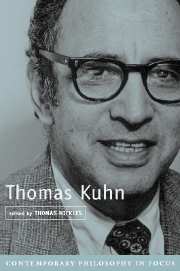Book contents
- Frontmatter
- Contents
- Contributors
- Preface
- Introduction
- 1 Kuhn and Logical Empiricism
- 2 Thomas Kuhn and French Philosophy of Science
- 3 Normal Science and Dogmatism, Paradigms and Progress: Kuhn ‘versus’ Popper and Lakatos
- 4 Kuhn's Philosophy of Scientific Practice
- 5 Thomas Kuhn and the Problem of Social Order in Science
- 6 Normal Science: From Logic to Case-Based and Model-Based Reasoning
- 7 Kuhn, Conceptual Change, and Cognitive Science
- 8 Kuhn on Concepts and Categorization
- 9 Kuhn's World Changes
- 10 Does The Structure of Scientific Revolutions Permit a Feminist Revolution in Science?
- Selected References in English
- Index
- References
6 - Normal Science: From Logic to Case-Based and Model-Based Reasoning
Published online by Cambridge University Press: 07 December 2009
- Frontmatter
- Contents
- Contributors
- Preface
- Introduction
- 1 Kuhn and Logical Empiricism
- 2 Thomas Kuhn and French Philosophy of Science
- 3 Normal Science and Dogmatism, Paradigms and Progress: Kuhn ‘versus’ Popper and Lakatos
- 4 Kuhn's Philosophy of Scientific Practice
- 5 Thomas Kuhn and the Problem of Social Order in Science
- 6 Normal Science: From Logic to Case-Based and Model-Based Reasoning
- 7 Kuhn, Conceptual Change, and Cognitive Science
- 8 Kuhn on Concepts and Categorization
- 9 Kuhn's World Changes
- 10 Does The Structure of Scientific Revolutions Permit a Feminist Revolution in Science?
- Selected References in English
- Index
- References
Summary
INTRODUCTION
The central distinction of Thomas Kuhn's The Structure of Scientific Revolutions (1962) is that between normal science and revolutionary science. He offered suggestive and provocative but sketchy accounts of both. Most historians and sociologists who have discussed Kuhn's work have maintained that his account of normal science is the more important, while philosophers and culture theorists – and Kuhn himself – have tended to regard his claims about revolutionary discontinuities and incommensurability as his truly original contribution. In my judgment, the problems that Kuhn engaged in his account of normal science are more heuristically promising for understanding scientific inquiry and human inquiry more generally. Subsequent developments in cognitive psychology have vindicated Kuhn's departures from standard theories of cognition. It may even be the case that what is worth saving in Kuhn's treatment of revolutions depends on the account of cognition that he developed for normal science. After all, Kuhn's own most informative characterization of revolutionary science is that it is extraordinary – nonnormal. Accordingly, I shall examine Kuhn's account of normal scientific cognition as puzzle-solving practices guided by the exemplary problem solutions that he called “exemplars,” together with what he termed “an acquired similarity relation.” I shall center my discussion on that most basic problem concerning the very possibility of inquiry – the Meno paradox – and indicate how Kuhn's account of scientific inquiry attempts to solve it. Here I must limit myself to the “early” Kuhn of Structure and the related essays written in the 1960s and 1970s.
- Type
- Chapter
- Information
- Thomas Kuhn , pp. 142 - 177Publisher: Cambridge University PressPrint publication year: 2002
References
- 10
- Cited by



